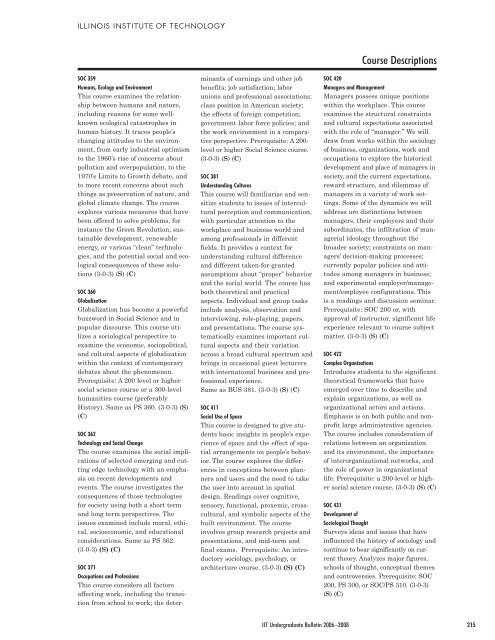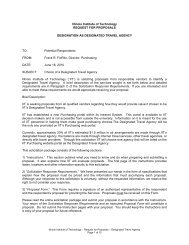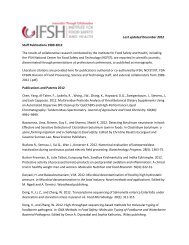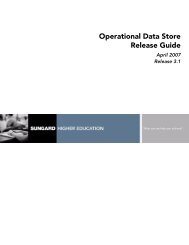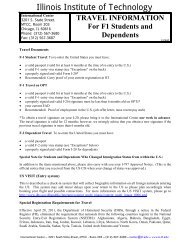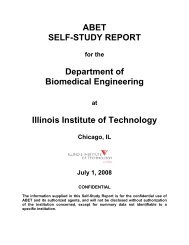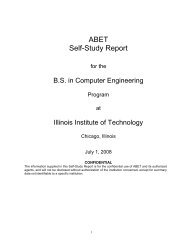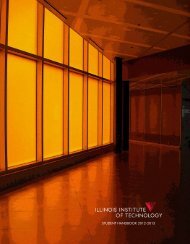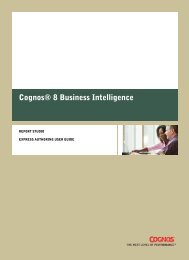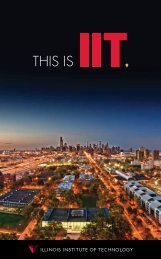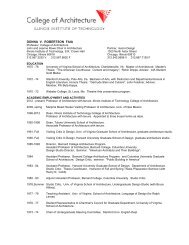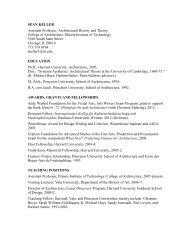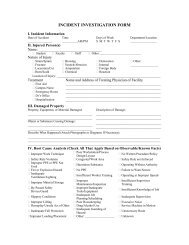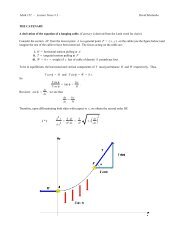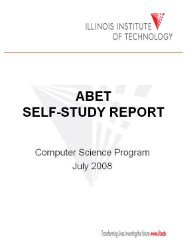Copyright & Disclaimer Information - Illinois Institute of Technology
Copyright & Disclaimer Information - Illinois Institute of Technology
Copyright & Disclaimer Information - Illinois Institute of Technology
Create successful ePaper yourself
Turn your PDF publications into a flip-book with our unique Google optimized e-Paper software.
SOC 359<br />
Humans, Ecology and Environment<br />
This course examines the relationship<br />
between humans and nature,<br />
including reasons for some wellknown<br />
ecological catastrophes in<br />
human history. It traces people’s<br />
changing attitudes to the environment,<br />
from early industrial optimism<br />
to the 1960’s rise <strong>of</strong> concerns about<br />
pollution and overpopulation, to the<br />
1970’s Limits to Growth debate, and<br />
to more recent concerns about such<br />
things as preservation <strong>of</strong> nature, and<br />
global climate change. The course<br />
explores various measures that have<br />
been <strong>of</strong>fered to solve problems, for<br />
instance the Green Revolution, sustainable<br />
development, renewable<br />
energy, or various “clean” technologies,<br />
and the potential social and ecological<br />
consequences <strong>of</strong> these solutions<br />
(3-0-3) (S) (C)<br />
SOC 360<br />
Globalization<br />
Globalization has become a powerful<br />
buzzword in Social Science and in<br />
popular discourse. This course utilizes<br />
a sociological perspective to<br />
examine the economic, sociopolitical,<br />
and cultural aspects <strong>of</strong> globalization<br />
within the context <strong>of</strong> contemporary<br />
debates about the phenomenon.<br />
Prerequisite: A 200 level or higher<br />
social science course or a 300-level<br />
humanities course (preferably<br />
History). Same as PS 360. (3-0-3) (S)<br />
(C)<br />
SOC 362<br />
<strong>Technology</strong> and Social Change<br />
The course examines the social implications<br />
<strong>of</strong> selected emerging and cutting<br />
edge technology with an emphasis<br />
on recent developments and<br />
events. The course investigates the<br />
consequences <strong>of</strong> those technologies<br />
for society using both a short term<br />
and long term perspectives. The<br />
issues examined include moral, ethical,<br />
socioeconomic, and educational<br />
considerations. Same as PS 362.<br />
(3-0-3) (S) (C)<br />
SOC 371<br />
Occupations and Pr<strong>of</strong>essions<br />
This course considers all factors<br />
affecting work, including the transition<br />
from school to work; the deter-<br />
<strong>Copyright</strong> & <strong>Disclaimer</strong> <strong>Information</strong>: <strong>Copyright</strong> © 1994, 1995, 1996, 1997, 1998, 1999, 2000, 2001, 2002, 2003, 2004, 2005, 2006, 2007. CollegeSource®, Inc. and Career Guidance Foundation. CollegeSource® digital catalogs are derivative works owned and copyrighted by CollegeSource®, Inc. and Career Guidance Foundation. Catalog content is owned and copyrighted by the appropriate school. While CollegeSource®, Inc. and Career Guidance Foundation provides information as a service to the public, copyright is retained on all digital catalogs.<br />
<strong>Copyright</strong> & <strong>Disclaimer</strong> <strong>Information</strong>: <strong>Copyright</strong> © 1994, 1995, 1996, 1997, 1998, 1999, 2000, 2001, 2002, 2003, 2004, 2005, 2006, 2007. CollegeSource®, Inc. and Career Guidance Foundation. CollegeSource® digital catalogs are derivative works owned and copyrighted by CollegeSource®, Inc. and Career Guidance Foundation. Catalog content is owned and copyrighted by the appropriate school. While CollegeSource®, Inc. and Career Guidance Foundation provides information as a service to the public, copyright is retained on all digital catalogs.<br />
minants <strong>of</strong> earnings and other job<br />
benefits; job satisfaction; labor<br />
unions and pr<strong>of</strong>essional associations;<br />
class position in American society;<br />
the effects <strong>of</strong> foreign competition;<br />
government labor force policies; and<br />
the work environment in a comparative<br />
perspective. Prerequisite: A 200level<br />
or higher Social Science course.<br />
(3-0-3) (S) (C)<br />
SOC 381<br />
Understanding Cultures<br />
This course will familiarize and sensitize<br />
students to issues <strong>of</strong> intercultural<br />
perception and communication,<br />
with particular attention to the<br />
workplace and business world and<br />
among pr<strong>of</strong>essionals in different<br />
fields. It provides a context for<br />
understanding cultural difference<br />
and different taken-for-granted<br />
assumptions about “proper” behavior<br />
and the social world. The course has<br />
both theoretical and practical<br />
aspects. Individual and group tasks<br />
include analysis, observation and<br />
interviewing, role-playing, papers,<br />
and presentations. The course systematically<br />
examines important cultural<br />
aspects and their variation<br />
across a broad cultural spectrum and<br />
brings in occasional guest lecturers<br />
with international business and pr<strong>of</strong>essional<br />
experience.<br />
Same as BUS 381. (3-0-3) (S) (C)<br />
SOC 411<br />
Social Use <strong>of</strong> Space<br />
This course is designed to give students<br />
basic insights in people’s experience<br />
<strong>of</strong> space and the effect <strong>of</strong> spatial<br />
arrangements on people’s behavior.<br />
The course explores the differences<br />
in conceptions between planners<br />
and users and the need to take<br />
the user into account in spatial<br />
design. Readings cover cognitive,<br />
sensory, functional, proxemic, crosscultural,<br />
and symbolic aspects <strong>of</strong> the<br />
built environment. The course<br />
involves group research projects and<br />
presentations, and mid-term and<br />
final exams. Prerequisite: An introductory<br />
sociology, psychology, or<br />
architecture course. (3-0-3) (S) (C)<br />
IIT Undergraduate Bulletin 2006–2008<br />
Course Descriptions<br />
SOC 420<br />
Managers and Management<br />
Managers possess unique positions<br />
within the workplace. This course<br />
examines the structural constraints<br />
and cultural expectations associated<br />
with the role <strong>of</strong> “manager.” We will<br />
draw from works within the sociology<br />
<strong>of</strong> business, organizations, work and<br />
occupations to explore the historical<br />
development and place <strong>of</strong> managers in<br />
society, and the current expectations,<br />
reward structure, and dilemmas <strong>of</strong><br />
managers in a variety <strong>of</strong> work settings.<br />
Some <strong>of</strong> the dynamics we will<br />
address are distinctions between<br />
managers, their employers and their<br />
subordinates, the infiltration <strong>of</strong> managerial<br />
ideology throughout the<br />
broader society; constraints on managers’<br />
decision-making processes;<br />
currently popular policies and attitudes<br />
among managers in business;<br />
and experimental employer/management/employee<br />
configurations. This<br />
is a readings and discussion seminar.<br />
Prerequisite: SOC 200 or, with<br />
approval <strong>of</strong> instructor, significant life<br />
experience relevant to course subject<br />
matter. (3-0-3) (S) (C)<br />
SOC 422<br />
Complex Organizations<br />
Introduces students to the significant<br />
theoretical frameworks that have<br />
emerged over time to describe and<br />
explain organizations, as well as<br />
organizational actors and actions.<br />
Emphasis is on both public and nonpr<strong>of</strong>it<br />
large administrative agencies.<br />
The course includes consideration <strong>of</strong><br />
relations between an organization<br />
and its environment, the importance<br />
<strong>of</strong> interorganizational networks, and<br />
the role <strong>of</strong> power in organizational<br />
life. Prerequisite: a 200-level or higher<br />
social science course. (3-0-3) (S) (C)<br />
SOC 431<br />
Development <strong>of</strong><br />
Sociological Thought<br />
Surveys ideas and issues that have<br />
influenced the history <strong>of</strong> sociology and<br />
continue to bear significantly on current<br />
theory. Analyzes major figures,<br />
schools <strong>of</strong> thought, conceptual themes<br />
and controversies. Prerequisite: SOC<br />
200, PS 300, or SOC/PS 310. (3-0-3)<br />
(S) (C)<br />
215


